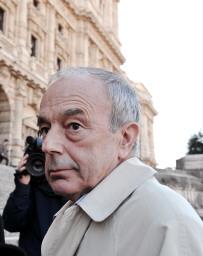The top official at Italy's supreme court asked judges Tuesday to uphold a ruling in a high-profile right-to-life case.
Cassation Court Prosecutor-General (PG) Domenico Iannelli advised the court to confirm the July ruling that would allow doctors to switch off the life support system of Eluana Englaro, a 35-year-old woman trapped in an irreversible coma for the past 16 years.
Iannelli asked the court to quash an appeal from Milan prosecutors, saying it was ''inadmissible'' because the case did not concern the general interest, as the prosecutors argued, but individual rights.
Lawyers for Englaro's elderly father Beppino Englaro, who has been trying to have the life support system turned off since 1999, hailed the PG's counsel.
''It's time to let Eluana die,'' one said.
But they said they expected the court to take ''all due time'' in considering its verdict.
They said they did not expect a ruling Tuesday.
Beppino Englaro left the court for his home in Milan without commenting on the PG's recommendation.
It is relatively rare for Cassation Court judges to go against the recommendations of their PGs.
Englaro has appeared on TV frequently in the last few years, asking officials to free his daughter from what he says is ''the inhumane and degrading condition in which she is forced to exist''.
Englaro argues that Eluana, who was left brain dead in a car crash in her Lombardy hometown of Lecco in 1992 when she was 19, said plainly during her life that she would not wish to live in a vegetative state.
He has also expressed concern about what will happen to her when he himself dies.
The Milan prosecutors appealed to the Cassation Court after a Milan appeals court ruled on July 9 that Englaro's life support system could be switched off.
The Milan appeals court reconsidered the case after an October decision by the Cassation Court which said a person's right to decide their own medical treatment should be respected even if this would cause their death.
Political observers note that there is currently a legislative void in Italy on issues such as living wills and related end-of-life questions. They say the courts do not have the authority to take such sensitive decisions without clear backing from the legislature.
Critics of the decision to turn off the life support system have accused judges of sneaking in euthanasia through the backdoor.
There have been bipartisan moves in parliament to legislate in the case but so far they have come to nothing.
The Englaro case has often been compared to that of American Terry Schiavo, the severely brain-damaged Florida woman whose case sparked a worldwide debate over end-of-life issues.
Schiavo died in March 2006 after her feeding tube was removed at court orders and over the objections of her parents.









